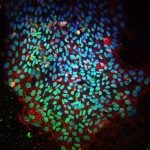Link to Pubmed [PMID] – 30849075
Link to HAL – pasteur-03278619
Link to DOI – 10.1371/journal.pgen.1008018
PLoS Genet 2019 Mar; 15(3): e1008018
Several bacteria in the gut microbiota have been shown to be associated with inflammatory bowel disease (IBD), and dozens of IBD genetic variants have been identified in genome-wide association studies. However, the role of the microbiota in the etiology of IBD in terms of host genetic susceptibility remains unclear. Here, we studied the association between four major genetic variants associated with an increased risk of IBD and bacterial taxa in up to 633 IBD cases. We performed systematic screening for associations, identifying and replicating associations between NOD2 variants and two taxa: the Roseburia genus and the Faecalibacterium prausnitzii species. By exploring the overall association patterns between genes and bacteria, we found that IBD risk alleles were significantly enriched for associations concordant with bacteria-IBD associations. To understand the significance of this pattern in terms of the study design and known effects from the literature, we used counterfactual principles to assess the fitness of a few parsimonious gene-bacteria-IBD causal models. Our analyses showed evidence that the disease risk of these genetic variants were likely to be partially mediated by the microbiome. We confirmed these results in extensive simulation studies and sensitivity analyses using the association between NOD2 and F. prausnitzii as a case study.




